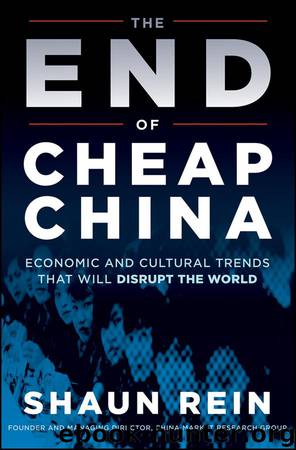The End of Cheap China: Economic and Cultural Trends That Will Disrupt the World by Shaun Rein

Author:Shaun Rein
Language: eng
Format: mobi, epub
Tags: Business & Economics, General
ISBN: 9781118239940
Publisher: Wiley
Published: 2012-02-13T05:00:00+00:00
One of the biggest problems facing China today is forced land appropriations and the eviction of peasants, done to allow real estate developers to build more housing units or so the government can launch new infrastructure projects like high-speed railways or subway systems. Many unsavory local officials, bribed by real estate developers, use corrupt local police and thugs to drive peasants out of their homes to build new projects. Because local governments often raise the bulk of their tax revenue from land sales, or their officials benefit from family relationships, some of them push for real estate development at all costs. They often do not adequately compensate those that need to be relocated. The more courageous citizens fight back against this injustice. In some instances, thugs are sent to beat and maim holdouts, and riots spill out into the general population.
Fueled by bubbling anger at endemic local corruption, these riots soon turn into massive conflagrations. Thousands of people quickly congregate and start causing bedlam. Protesters generally are not trying to overthrow the entire political system, but just attempting to stop what they see as thievery and brutish behavior on the part of local officials.
Western analysts often wrongly blame the central government for these battles, or assume that rioting means that local populations want to overthrow the government, similar to what happened in Egypt and Tunisia during the Arab Spring. International news media often gloss over the distinction between local and central governments or miss it entirely, so many times mass protests against corrupt local authorities in small, county-level cities get framed in the headlines as demonstrations against “Beijing” or “the Chinese government” that threaten their very legitimacy.
However, the central government does not condone these practices. The state-run China Daily, for instance, quoted research results from the Centre for Research on Social Contradictions that showed the biggest cause for unrest and mass protest in 2010 was forced evictions. They point to unfair local officials as the cause for nearly 180,000 instances of mass protest in that year. Prime Minister Wen Jiabao has also issued edicts preventing local police from participating in forced evictions and demolitions. Central authorities have also banned the use of violence and coercion to force people to move, and have pushed for giving evicted homeowners the right to appeal.
Yet with the money and skullduggery involved with real estate (The Hurun Report found that 23.5 percent of the 1,000 wealthiest Chinese earned their money primarily through real estate development), the situation is bound to worsen if the government does not enforce regulations in place.
The anger is very real, and for people who lost their homes, anger can potentially erupt into violence. Most people I have spoken to who have been evicted against their will are enraged, but believe the blame rests squarely on corrupt local officials in bed with real estate developers, rather than the whole government system.
Beijing’s leaders understand the direness of the situation. One senior leader exasperatedly told me, “We have to stop these thugs at the local level.
Download
The End of Cheap China: Economic and Cultural Trends That Will Disrupt the World by Shaun Rein.epub
This site does not store any files on its server. We only index and link to content provided by other sites. Please contact the content providers to delete copyright contents if any and email us, we'll remove relevant links or contents immediately.
International Integration of the Brazilian Economy by Elias C. Grivoyannis(111038)
The Radium Girls by Kate Moore(12020)
Turbulence by E. J. Noyes(8041)
Nudge - Improving Decisions about Health, Wealth, and Happiness by Thaler Sunstein(7695)
The Black Swan by Nassim Nicholas Taleb(7114)
Rich Dad Poor Dad by Robert T. Kiyosaki(6613)
Pioneering Portfolio Management by David F. Swensen(6292)
Man-made Catastrophes and Risk Information Concealment by Dmitry Chernov & Didier Sornette(6011)
Zero to One by Peter Thiel(5790)
Secrecy World by Jake Bernstein(4744)
Millionaire: The Philanderer, Gambler, and Duelist Who Invented Modern Finance by Janet Gleeson(4472)
The Age of Surveillance Capitalism by Shoshana Zuboff(4282)
Skin in the Game by Nassim Nicholas Taleb(4242)
The Money Culture by Michael Lewis(4199)
Bullshit Jobs by David Graeber(4181)
Skin in the Game: Hidden Asymmetries in Daily Life by Nassim Nicholas Taleb(3994)
The Dhandho Investor by Mohnish Pabrai(3761)
The Wisdom of Finance by Mihir Desai(3738)
Blockchain Basics by Daniel Drescher(3575)
